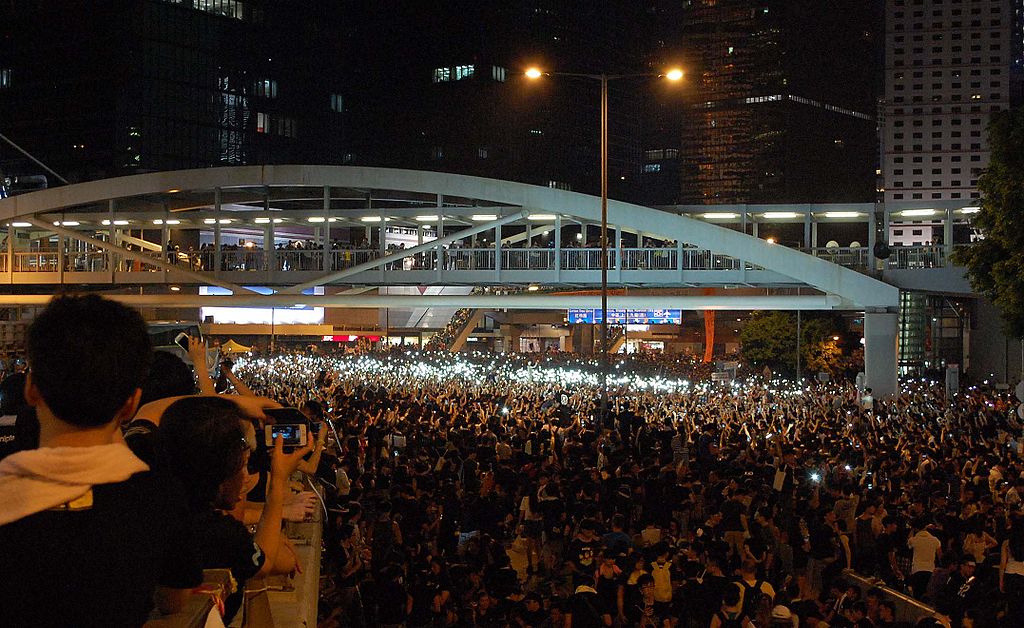Headline
Hong Kong protesters try to win over tourists from mainland China but get an earful instead

Protesters occupying Harcourt Road, Admiralty hold a “candlelight vigil” (with mobile phones) during Occupy Central, 2014 Hong Kong protests. Citobun / Wikimedia Commons.
HONG KONG—The luxury boutiques of Hong Kong’s Tsim Shai Tsui district are so mobbed with vacationing Chinese customers that store owners have put up red velvet ropes to control the crowds. Pro-democracy protesters saw it as a perfect spot to spread the word to their mainland brethren.
But instead of support, many of the young demonstrators got an earful Wednesday from grumpy tourists who appeared more intent on shopping than talking about democracy. Some complained that Hong Kong already enjoys more freedom than the rest of the country.
“What you kids are doing is meaningless! You are too idealistic!” a woman in her late 50s shouted at the students who are conducting sit-ins in the tony neighbourhood.
“What they’re doing is quite selfish and doesn’t make them look good,” added Selena Lau, 45, who was visiting from Guangzhou.
The students have been boycotting classes since early last week, and more protesters of all ages have since joined huge street demonstrations calling for genuine democratic reforms in the semiautonomous enclave. Police tried to disperse them with tear gas Sunday, but they regrouped and spread to several other neighbourhoods.
No images of the protests have been shown in China’s state-run media on the mainland, where a 1989 pro-democracy movement was crushed in a brutal crackdown in Beijing’s Tiananmen Square and has not been tolerated since.
The media blackout prompted some student demonstrators to spread their message in the Tsim Shau Tsui district Wednesday, the start of a seven-day holiday on the mainland.
The group was hoping to “get the attention of the mainland tourists … who may not have heard anything about what is happening in Hong Kong,” said Serena Chan, a 17-year-old student at Hong Kong University.
About 200 people, mostly students, had gathered by afternoon, setting up a blue tarp and sitting cross-legged. Entrances to the district’s boutiques offering brands such as Louis Vuitton and Gucci remained unobstructed.
“I do support democracy, but not when protesters are blocking the streets and inconveniencing everyone,” Lau said. “The government has some responsibility, too. They should try to negotiate with the protesters and have some dialogue.”
Lau noted that many parts of the world don’t have democracy, and that Hong Kong has more liberty than the rest of China.
“People in Hong Kong are already so lucky, and they should just work hard to make better lives for themselves,” she said. “That’s what people in mainland China do. We just think that if we work hard, we fend for ourselves; we don’t make demands of the government.”
Hong Kong and the mainland have long had an uneasy relationship, with residents of the former British colony seeing themselves as urbane and cosmopolitan, while viewing mainlanders as uneducated and ill-mannered.
When China took over Hong Kong in 1997, it negotiated a “one country, two systems” arrangement that ensured the territory would retain its Western-style civil liberties, and promised eventual universal suffrage. Beijing’s recent decision to impose a screening process for candidates in the territory’s first direct election in 2017 was seen by many in Hong Kong as reneging on that promise, prompting the protests.
“Would Hong Kong people really prefer to be a colony of Britain than be a part of China?” asked a 45-year-old man from Heilongjiang province who gave only his surname, Chen.
He spoke initially with a reporter but gradually raised his voice to address his comments to the nearby protesters.
“People just need to have good livelihoods; the other things don’t matter,” Chen said.
Eric Tang, a 32-year-old protester, said tourists from other countries were more sympathetic to their cause.
“The Chinese people who come to this area tend to be the privileged and the wealthy who benefit from the undemocratic system in China,” he said. “I don’t think we’re going to have much success trying to change their thinking.”
Some people on the mainland, however, have shared information and expressed support for the protests by circumventing the tough censorship on social media, often via cellphone messaging services.
One visitor, Lam Hong from Shenzhen, said he was joining the pro-democracy rallies.
“I hadn’t seen any news about protests in Hong Kong before arriving this morning to visit friends,” said the 43-year-old small business owner. “I joined in because I support what Hong Kongers are trying to do and why they’re angry. There’s supposed to be ‘one country, two systems.”‘
Lam added: “With police treating protesters like they did, it seems as if Hong Kong is already the same as China.”
Associated Press writer Ian Mader in Beijing contributed to this report.





















